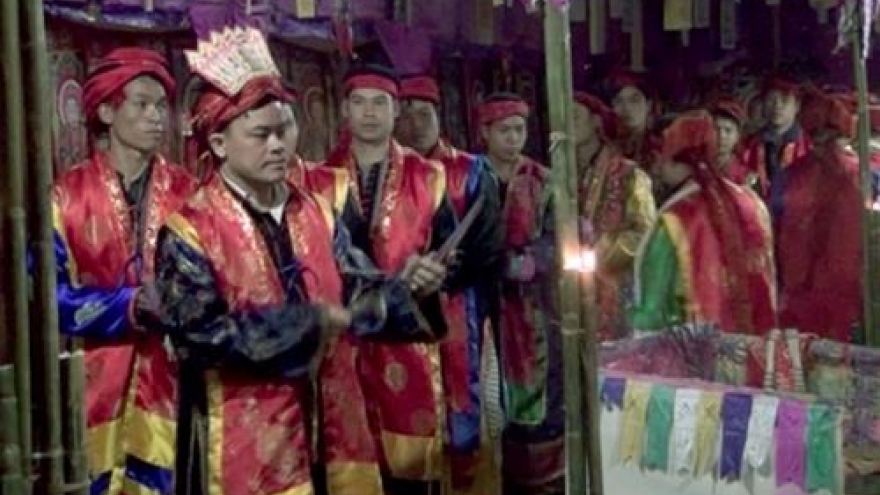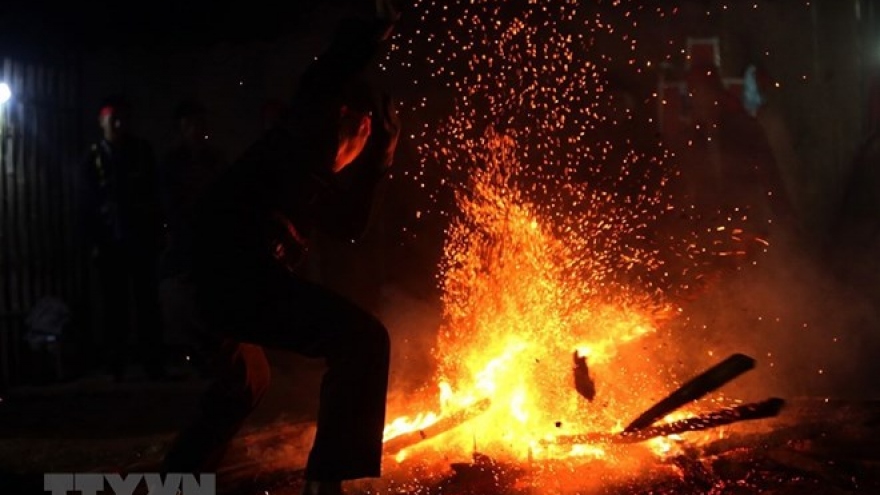Pao Dung – traditional singing of Vietnam’s Dao ethnic minority
VOV.VN - Pao Dung is the traditional singing of the Dao ethnic minority people living in northern Vietnam.
 |
“Dung” means “singing” in the Dao language. The singing style is also called “Pa Dung” or “Ay Dung”. Pao Dung lyrics describe the Dao people’s daily activities - lullabying, playing, complaining, working, flirting – or are designed for rituals, such as weddings, funerals, or coming-of-age. The songs can be improvised for different situations. For example, Páo Dung songs sung at the new year festivals are improvised wishes for wealth, luck, peace, and happiness. But Pao Dung songs for rituals are fixed. The lyrics and rhythms follow specific religious benchmarks, because religion plays a very role in Dao life.
Bon Van Ban, head of Nam Ngat village, Ha Giang province, said “I have a notebook to write down all the songs. I learn all the lyrics by heart. There are hundreds of Pao Dung songs. I can sing one in any situation.”
Most Pao Dung lyrics are in the Dao language. Each family has a song book written by the elders, but younger people sometimes translate the lyrics into Vietnamese. The Pao Dung style, though, is preserved through multiple generations. The Dao people in Nam Ngat have preserved 54 flirting song, 18 wedding songs, and 8 funeral songs. Mr. Ban does not remember when he started learning those songs.
“If you want to do it, you just go ahead. Because I wanted to learn Pao Dung songs, I watched older people singing and imitated them, I soon memorized the songs. If someone doesn’t want to know them, he will never remember them no matter how often you teach him. It took me just 4 years to learn all the songs,” Ban elaborated.
Ban Van Quyen of Quang Ninh province also loves traditional Pao Dung singing. He said “I know many songs to sing in many different situations. As Pao Dung singing began hundreds of years ago, there are hundreds of song books in the Dao language. I have some books. Some songs are hard to translate into Vietnamese, but I still remember them all.”
 |
| Páo Dung songs are performed at a coming-of-age ritual of the Dao people. (Photo: baoyenbai.com.vn) |
The main difference between life activity songs and religious songs is the instrument. Religious Pao Dung songs are accompanied by bells, which create a spiritual atmosphere. Everyday songs are sung without instruments. The songs often have romantic lyrics. Different Dao groups have different Pao Dung songs. The Dao who wear white trousers (Dao Quan trang) prefer long, low notes, while the Dao who wear tight trousers (Dao Quan chẹt) love to sing high notes. Whether old or new or how they are sung, Pao Dung songs always encouragement people to help others, call for fruitful production, and praise love and life, according to Mr. Ban.
“The lyrics and rhythm of each song are distinctive but all the songs express our wish for prosperity, wealth, and happiness,” he added.
The Dao people might sing a Pao Dung song at any time and any place: a spring festival, a market, a terraced rice field. They divide into groups and stand forming a letter V while singing. In the terraced fields, they sing about the happiness of working, cultivation methods, and weather.
When bidding farewell to a child who is going away to study or work, they sing to ask them to work hard and remember their parents’ sacrifice. At weddings, mothers sing to remind their daughters to wake up early, be industrious, and take care of their husbands’ families. At a coming-of-age ritual, Pao Dung songs are about the group’s origin, ancestors, and ethics.
“In the fields, we sing about growing rice and corn. At a festival, we sing about food and sitting around a feast,” Mr. Ban said.
Many types of Pao Dung songs can be sung together. When young men of another village come to sing, they first sing to ask for permission and praise their hosts with “Pao phay” songs, which are similar to poem chanting. After a while, the host women sing in response several “Pao dung om” (many of which are sung in a call and response pattern between single men and women). Eventually, they all sing “Páo dung hộp tíu” - drinking songs - before sitting down to a feast.
Pao Dung lyrics are based on two kinds of poems: lục bat (alternating six-and eight-syllable lines) and that ngon (seven syllables per line). First-time listeners may find the songs unstructured, but, in fact, the lyrics strictly follow the rules of those two poem types.
Among the many sub-genres of Pao Dung, flirting songs seem to be the most loved. They are sung at festivals, weddings, the lunar new year, and the harvesting season. Dao people consider Pao Dung flirting songs the breath of life.
These songs are sung either by one man and one woman or a group of men and a group of women, or sometimes by two villages. The lyrics are romantic and the melodies are gentle, so the Dao can sing Pao Dung flirting songs non-stop for 3 days and nights.
 |
| Singers often stand in letter V while performing Pao Dung. (Photo: trangtraiviet.vn) |
“That’s a piece sung by the bride’s team to ask ‘where are you going today’. Then the groom’s team replies, ‘we come here to take your daughter to our home’. The bride’s team asks and the groom’s team answers at the gate. Once 14 lines of each answer are completed, they move further inside. They ask and answer again in the yard, and then again inside the house. There are so many songs for a wedding that they sing all one day and one night,” Mr. Bằn explained.
The flirting kind of Pao Dung is sung as a confession and a proposal in which the sky, stars, moon, ocean, and mountains are metaphors for loyalty and eternal love. The songs may represent calling, welcoming, or a sulk.
"When two people fall in love with each other, they sing it loudly. The lyrics go ‘when we live together happily, the soup is still delicious even without salt’,” Mr. Quyen said.
The Dao love Pao Dung so much they sing as if they have forgotten the time. They might say goodbye and then reunite in lunar August or September, when the harvest is done, to enjoy singing again.


